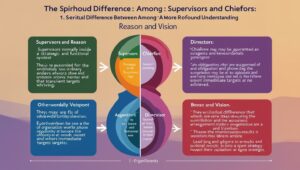The Spiritual Difference Between Managers and Directors
In current associations, the two administrators and chiefs assume critical parts in guaranteeing the powerful working of groups, projects, and the generally speaking vital course. While their obligations might cover in certain areas, their center capabilities, administration styles, and viewpoints on their jobs can vary altogether. In any case, there is a frequently neglected however urgent viewpoint that isolates them: their profound contrasts.
The the spiritual difference between managers and directors part of initiative alludes to how people associate with others, rouse groups, and lead with reason, values, and vision. This article dives into thethe spiritual difference between managers and directors, investigating how their way to deal with authority is molded by how they might interpret reason, impact, and arrangement with more extensive hierarchical objectives.
Getting a handle on the Positions: Chiefs versus Bosses
Preceding diving into the supernatural differences, spreading out a sensible understanding of the positions of bosses and bosses in an association is huge.
1. Chiefs
Bosses are routinely at risk for coordinating regular undertakings inside a gathering or division. They deal with the assets, work processes, and individuals to guarantee undertakings are finished proficiently and objectives are met. Their job frequently includes:
Task The board: Laying out objectives, assigning liabilities, and it are fulfilled to guarantee time constraints.
Critical thinking: Resolving prompt issues and difficulties that emerge inside their group.
Individuals The executives: Encouraging associations with representatives, settling clashes, and offering help for individual and expert development.

2. Chiefs Chiefs, then again, hold a more essential job. They are answerable for regulating more extensive authoritative objectives and adjusting departmental goals to the organization’s general vision. Their obligations commonly include:
Key Preparation: Growing long haul designs that guide the association toward progress.
Authority: Giving direction to ranking directors and guaranteeing their groups are pursuing the organization’s objectives.
Navigation: Going with undeniable level choices that influence the general heading of the association.
While the two jobs share administration and administrative obligations, the profound contrast among administrators and chiefs lies by they way they approach their initiative obligations, the manner in which they lead groups, and their capacity to move and associate with others.

The Profound Distinction Among Supervisors and Chiefs: A More profound Understanding
1. Reason and Vision
The main the spiritual difference between managers and directors is their association with reason and vision.
Supervisors and Reason:
Supervisors normally work inside a more strategic and functional system. Their consideration is on ensuring that ordinary endeavors are done and that transient targets are achieved. While this is fundamental for an affiliation’s thriving, bosses may not be guaranteed to see the greater vision. In light of everything, they are by and large more revolved around ensuring that immediate targets are met with exactness. Otherworldly Viewpoint: Chiefs might have areas of strength for an of obligation and obligation toward individuals they supervise and the errands they make due. Nonetheless, their administration may be more grounded in viable results as opposed to a more profound the spiritual difference between managers and directors arrangement with an association’s general mission.
Bosses and Vision:
Bosses are very closely related to the big picture and the rationale for the organization. They lead long, putting into perspective how their choices and structures fit into the grand strategy. Bosses aim to get results as well as to move their teams toward a large explanation.

Otherworldly Point of view: The profound substance of directorship includes administration
that rises above everyday assignments. Chiefs are viewed as the spiritual difference between managers and directors aides who adjust the aggregate exertion of the association with a bigger reason. Their vision isn’t just about productivity or proficiency; it’s tied in with making esteem and an enduring effect.
Along these lines, the otherworldly distinction among chiefs and chiefs becomes clear. Chiefs center around the “how” and the “what,” while chiefs center around the “why” — the basic reason driving the association and its kin.
2. Administration Styles: Control versus Strengthening
One more key the spiritual difference between managers and directors contrast among administrators and chiefs lies in their authority style.
Executives and Control:
Chiefs are oftentimes expected to have control over cycles, work cycles, and gatherings. They ensure that endeavors are done on time, screen execution, and monitor everything. This control-arranged drive can incite a more coordinated, rule-based environment.
Otherworldly Point of view: From a profound stance, a director’s job is centered around making security and consistency inside their group. Be that as it may, this can in some cases bring about a more conditional relationship with representatives, where the accentuation is on accomplishing objectives and measuring up to assumptions, frequently to the detriment of imagination and self-improvement.
Chiefs and Strengthening:
Interestingly, chiefs will quite often embrace a really enabling initiative style. Their job is less about controlling the cycle and more about engaging others to take responsibility for work. Chiefs motivate trust and empower independence, permitting their groups to improve and line up with the association’s bigger mission.
Profound Viewpoint: The the spiritual difference between managers and directors methodology of a chief includes confiding in the intrinsic capability of others. Bosses set an example for others to follow and encourage the development of their meetings, creating an environment where individuals can flourish and perform to the best of their abilities. Representatives feel esteemed and a piece of a greater reason, which advances critical regard and enchanted satisfaction in the working environment.
In this manner, the extraordinary qualification among managers and bosses to the extent that power style is that heads often revolve around staying aware of control, while bosses base on empowering others to lead and add to the more unmistakable vision.

3. Relationship with Laborers: Authority versus Affiliation
Another region where the profound difference surfaces is the connection the spiritual difference between managers and directors bosses, and delegates.
Bosses and Authority:
Bosses ordinarily practice authority inside their groups. Their correspondence with delegates is frequently formative, since they can engage rules, dole out assignments, and assess execution. This is vital in certain circumstances, and yet, it might make a power distance that smothers open correspondence and trust.
Supernatural Perspective: As shown by a canny viewpoint, a chief’s occupation is in numerous ways viewed as a device to guarantee that work is finished. Nonetheless, assuming this power is taken advantage of unnecessarily or without alert, it could prompt sensations of separation and absence of satisfaction with respect to workers.
Supervisors and Association
While the bosses have more power regarding route, they show up at their gatherings with a fundamental sensation of facilitated exertion and a feeling of completeness. the spiritual difference between managers and directors understand that driving is definitely not a singular obligation, yet rather an aggregate liability that expects them to construct a local area joined by a common vision.
Powerful Perspective: The main’s profound technique includes making a feeling of having a place and shared regard. They endeavor to keep up with the outcome of their gathering, establishing a climate where every individual feels esteemed as a fundamental supporter of the progress of the association.
As such, the the spiritual difference between managers and directors differentiation the spiritual difference between managers and directors and bosses to the extent that agent associations is laid out in power versus association. Bosses every now and again revolve around power components, while bosses base on building associations considering normal respect, trust, and shared goals.
4. Course: Sound judgment versus Game plan with Values
The powerful cycle is another area where the significant differences among bosses and bosses become self-evident.
Chiefs and Sound judgment:
Chiefs frequently pursue choices in light of reasonableness and dire necessities. Their choices are driven by the need to resolve issues rapidly, remain inside financial plan, or meet explicit targets. Albeit these choices are fundamental for the smooth activity of the association, they could need further association with the core value of the affiliation.
Supernatural Viewpoint: On the off chance that one perspectives things according to a recondite viewpoint, a chief’s choices are regularly made more in light of outside yields — productivity, cost and viability — than on lining up with a higher reason or set of values.
Obligations of the Bosses and Values:
Bosses, nonetheless, look for choices that are imbued in the attributes and assumptions for the association. They weigh how every choice lines up with the mission, vision, and long haul objectives. For pioneers, independent course isn’t just about the thing to do yet in addition how it mirrors the core value of the association.

Significant Perspective: The boss’ powerful way to deal with free bearing is directed by a feeling of reliability and a feeling of plan with a more noteworthy explanation. Bosses frequently intentional on the more extensive effect their choices will have on individuals, the climate, and the fate of the association.
Here, the significant differentiation the spiritual difference between managers and directors and bosses lies in route: executives revolve around sensibility and capability, while bosses center around values and course of action with reason.
Conclusion: Bridging the Spiritual Difference Between Managers and Directors
This is the the spiritual difference between managers and directors bosses and bosses, which is more than task the executives versus administration. It’s about a relationship with reason, esteems, a style of drive, and how decisions are made. Where bosses center around ordinary errands, control, and quick outcomes, the spiritual difference between managers and directors take a lot more extensive and more visionary methodology. They lead because of reasons, engage others, and settle on decisions that mirror the quintessence of the affiliation.

Two positions that are essential to the progress of any association, yet understanding the profound aspects between them can prompt more extensive, satisfying authority. The differentiations between the two positions have been seen and embraced by the spiritual difference between managers and directors and bosses who could cooperate all the more all things considered and assist relationship with blossoming with both reasonable achievement and profound game plan.



